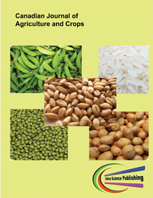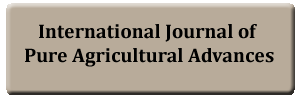Genotypic Variation for Response to Phosphorus Fertilization in Common Bean Mutants
DOI:
https://doi.org/10.20448/803.4.1.11.16Keywords:
Mutation, Beans, Phosphorus, Nodulation, Seed yield.Abstract
Common bean is a source of protein. However, its productivity among smallholder farmers is low and thus cannot sustain the demand. One of the constraints limiting bean production is phosphorus (P) deficiency. Use of efficient P utilizing genotypes is an option which is feasible to small scale farmers. One way of creating genetic variability is through mutation breeding which generates mutants genetically different from the parental genotype in one or few traits. The specific objectives of the study were (i) to evaluate seed yield potential of bean mutants in P limiting soils and (ii) to investigate the association of seed yield to nodulation among the evaluated bean mutants. The experiment was laid as a 5 (genotypes) x 3 (phosphorous levels) factorial design in the screen house. The genotypic and P effects were significant (p < 0.05) for vine length, nodulation, pod yield, seed yield, dry shoot biomass and root biomass. SZ3-3-B-B2 out-performed the parent in both seed yield per hectare and nodulation. The genotype x P interaction was highly significant (P< 0.001) for seed yield and the mutant SZ3-3-B-B2 produced a significantly higher yield at a fertilization rate of 30 Kg/ ha P than the parental genotype. It can be deduced that SZ3-3-B-B2 was the most efficient P utilizing genotype. In addition, the amount of phenotypic variation (r2) explained for the association between nodulation and yield was found to be 0.10. These results suggest that there is a possibility that artificial inoculation can enhance the performance of the evaluated bean mutants.


